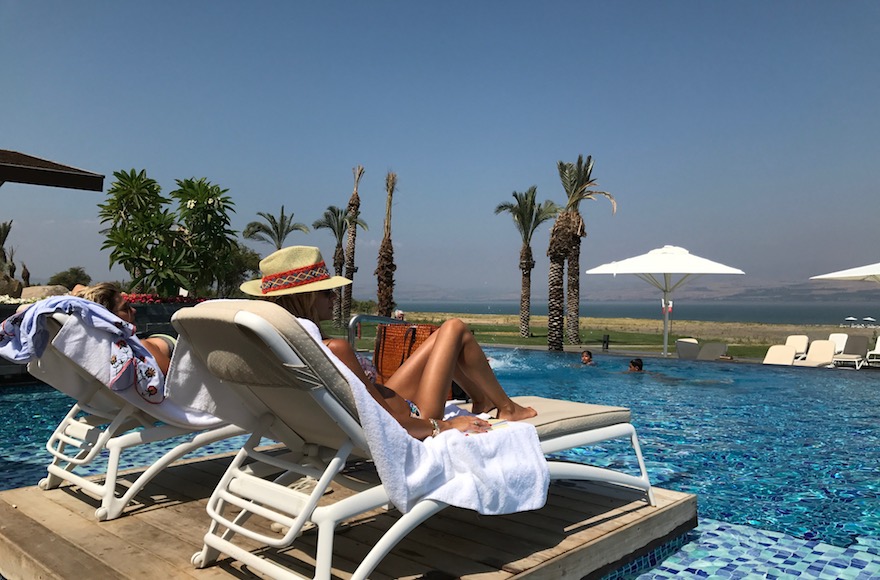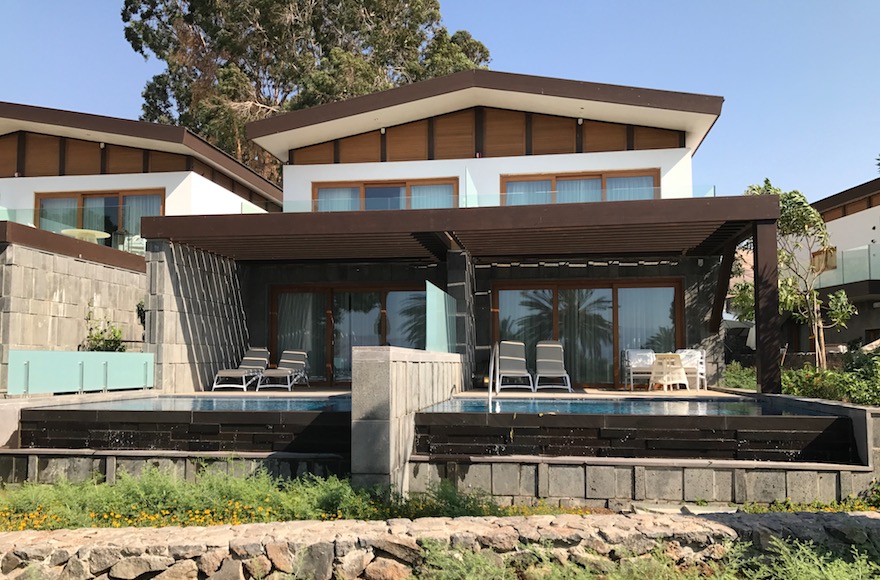After hosting Conan, new Israeli hotel aims to make Sea of Galilee luxury destination
Published August 28, 2017

A woman sunbathing at the Setai hotel on the shore of the Sea of Galilee in Israel, Aug. 25, 2017. (Andrew Tobin)
SEA OF GALILEE, Golan Heights (JTA) – Conan O’Brien is checking in this week.
ADVERTISEMENT
Israeli Prime Minister Benjamin Netanyahu has already been a guest. So have celebrity TV show hosts Assi Azar and Rotem Sela.
“There’s nothing else close to this hotel on the Kinneret,” said Roger Attias, the Setai Sea of Galilee’s project manager, using the Hebrew name for the lake. “It’s going to be No. 1 in Israel.”
Since its “soft opening” in June, the $250-million Setai has put a new sheen on the low-key Sea of Galilee. Both the hotel’s supporters and detractors expect the hotel to help transform the area by bringing in wealthy tourists like O’Brien, who is staying while filming a special Israel episode of his TBS talk show.
The Setai, which means “south beach” in Thai, stretches along 15 acres of remote lakeside like a modern hut village. Its dozens of white wood and glass buildings are connected by winding walkways lined with grass and palm trees. At the center of the complex, sunbathers lounge around an edgeless pool with a sweeping view of the lake. Other guests feast on fine cuts of meat in the dining room, sip top shelf cocktails in the lounge or indulge in hot stone massages in the spa.
Back in their rooms, some slide into personal edgeless pools, each with a slightly different view of the lake.

Some of the rooms at the Setai Sea of Galilee, Aug. 25, 2017. (Andrew Tobin)
According to Attias, the Setai was a “dream project” for the Israeli-American Nakash brothers, who brought the brand to the Sea of Galilee from Miami, where they own the flagship hotel in an art deco tower on the beach. He said they envision the project as an investment in Israel.
ADVERTISEMENT
“They wanted to build something that will stand for a generation,” Attias said. “Nobody else would have thought to do something like this here, on this end of the lake.”
Although a major tourist destination, the Sea of Galilee area offers little that could be considered high end, or even stylish. Most visitors stay in the biggest city, Tiberias, a working-class community of around 40,000. Others, especially Israeli vacationers, opt for bed-and-breakfasts or guesthouses in the local kibbutzim and villages. Some camp and barbecue at the public parks on the shore.
The major draws are the religious and archaeological sites and outdoor activities, especially water sports on the lake that Jesus is said to have walked on.
Despite its particularly remote location on the opposite side of the lake from Tiberias, in the Golan Heights, which Israel de facto annexed from Syria, the Setai is already attracting new, high-end tourism. Its 110 rooms, which cost approximately $500 to $900 a night, have been sold out for much of the summer and are filling up for the High Holidays.
Many of the guests, some 80 percent of whom are Israeli, come to the hotel despite turning up their noses at northern Israel, Attias said.
“These people love the lake, but they don’t come to the Kinneret for vacation. They think it’s tents and karaoke on the beach — or Tiberias, which unfortunately has a stigma,” he said.
The owner of a tennis school in Tel Aviv who was at the hotel with his wife and three young children last week said his family opted to come to the Setai over a trip to Europe. Last summer they vacationed in Vienna, Austria. Asking not to be identified to protect his privacy, he said his children loved the Sea of Galilee, but the public parks on the shore were “too loud.”
“There’s no other place like this in the North,” he said approvingly, despite some complaints about the lack of amenities on the beach. “We didn’t want something with all the people. We wanted to pay more to have more things.”
Lucy Castro and her husband traveled to the Setai from London, where they live when not in their native Paris. They made the trip because they had been impressed by a previous stay at the Setai in Miami. Although they had some issues with the service and the food, they were awed by the new Setai’s “magnifique” view and accommodations.
“The Setai in Miami is more elegant than this one, but they are making progress,” Castro said.
Attias said the Setai would not reach its full luxurious potential until the end of next year. A conference center and 47 new rooms with private pools and lake views are under construction, and the hotel has yet to win oversight of the beach it sits on. When that happens, Attias said, there are plans to bring in white sand, a helipad, a seaplane dock and facilities for windsurfing and parasailing.
In the meantime, Attias said, his main focus — and biggest challenge — has been training the hotel’s 180 employees, who mostly come from small local communities and are unfamiliar with the standards of world-class customer service.
“We have a big problem with getting all the staff to say hello to the guests,” he said. “I tell them, say good morning. What does it cost you?”
But he is optimistic.
“The service here can be even better than in the Setai in Miami,” he said. “You know why? Because my people aren’t robots. They have feelings. It’s not going to be easy, but it will happen.”

A golf cart making its way along the paths at the Setai Sea of Galilee, Aug. 25, 2017. (Andrew Tobin)
Beyond the employment it offers, government officials hope the Setai will boost economic growth across the Galilee. The region has long had relatively high unemployment, poverty and low wages. Outside of Tiberias, the residents — about half of whom are Arab — live in kibbutzim and villages.
Tiberias Mayor Yosef Ben David said the Setai is “a beautiful part of a coming change.” While the hotel is outside his municipal boundaries, he noted that four other luxury hotels are under construction in Tiberias and the Galilee. He said he is working with local and national officials to expand the kinds of tourism in the Galilee.
“Even though the Setia isn’t paying taxes to me, I’m very happy about it,” he said. “After two decades of economic stagnation, this is the start of a new dawn. It’s only the first hotel like this. We’re going to encourage more and more.”
Some locals have pushed back against the development of their area.
During the Setai’s construction, which started in 2010, protesters repeatedly gathered on the beach to demand it be preserved as a natural habitat and well-known kite surfing spot. Compromises were reached eventually, including allowing continued public access. Campers have been known to pitch a tent directly in front of the hotel’s swimming pool.
Yotam Stienberg, a resident of the nearby Maagan kibbutz who is engaged to marry the Setai’s public relations director, said he expects more of the Sea of Galilee shoreline to be developed in the coming years. While he knows that could affect the laid-back local lifestyle, he has seen bigger changes in the past three decades — like the end of communal childrearing on his kibbutz and when its dining hall was turned into an office for an insurance company.
More development could be good for his myriad family businesses, which include a pizza restaurant, a bicycle rental service and a maintenance company.
Plus, Stienberg said, “It gets boring around here sometimes.”















